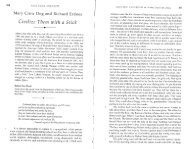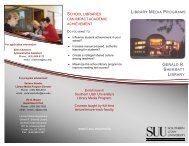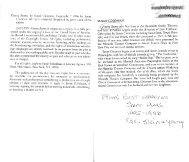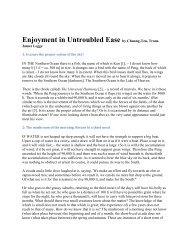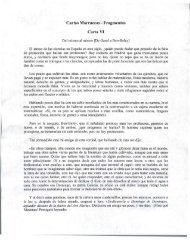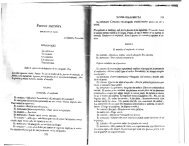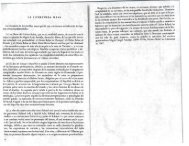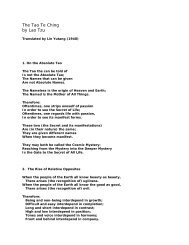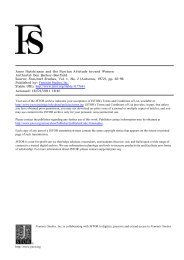Arthur Frank
Arthur Frank
Arthur Frank
Create successful ePaper yourself
Turn your PDF publications into a flip-book with our unique Google optimized e-Paper software.
WHEN BODIES NEED VOICES 307<br />
to the care of a physician. I understand this obligation of seelung medical care as a<br />
narrative surrender and mark it as the central moment in modernist illness experience.<br />
The ill person not only agrees to follow physical regimens that are prescribed;<br />
she also agrees, tacitly but with no less implication, to tell her story in medical<br />
(4<br />
terms. How are you?" now requires that personal feeling be contextualized within<br />
a secondhand medical report. The physician becomes the spokesperson for the<br />
disease, and the ill person's stories come to depend heavily on repetition of what the<br />
physician has said.<br />
Times have come full circle from Bourdieu's North African informant when<br />
we read of a patient whose running joke with his surgeon involves reporting his<br />
symptoms in an overdone version of medical obscurity. For example, "If you will<br />
diligently investigate the pilar projections rising sparsely from the vertext of my<br />
cranial ossification, you will detect a macular callosity which may have malignant<br />
potential."9 If modern medicine began when physicians asserted their authority as<br />
scientists by imposing specialized language on their patients' experiences, the postmodern<br />
divide is crossed when patients such as this one can mimic this language in<br />
a send-up of medicine that is shared with the physician. But lay familiarity with<br />
medical terms and techniques, even to the point of parody, is only one potential of<br />
the postmodern experience of illness.<br />
The postmodern experience of illness begins when ill people recognize that more<br />
is involved in their experiences than the medical story can tell. The loss of a life's<br />
map and destination are not medical symptoms, at least until some psychiatric<br />
threshold is reached. The scope of modernist medicine4efined in practices<br />
ranging from medical school curricula to billing categories--does not include helping<br />
patients learn to think differently about their post-illness worlds and construct<br />
new relationships to those worlds. Yet people like Judith Zaruches express a selfconscious<br />
need to think differently.<br />
Both the divide that was crossed from the premodern to the modern and that<br />
from modern to postmodern involve issues of voice. The woman reported by<br />
Bourdieu seems to perceive that medicine has taken away her voice: medicine assails<br />
her with words she does not want to know and leaves her not knowing what. But<br />
this woman does not perceive a need for what would now be called her own voice,<br />
a personal voice telling what illness has imposed on her and seeking to define for<br />
herself a new place in the world. What is distinct in postmodern times is people<br />
feeling a need for a voice they can recognize as their own.<br />
This sense of need for a personal voice depends on the availability of the<br />
means-the rhetorical tools and cultural legitimacyfor expressing this voice.<br />
Postmodern times are when the capacity for telling one's own story is reclaimed. Modernist<br />
medicine hardly goes away: the postmodern claim to one's own voice is halting,<br />
self-doubting, and often inarticulate, but such claims have enough currency for<br />
illness to take on a different feel.<br />
Voices tell stories. Stories are premodern; Bourdieu's informant suggests that<br />
the coming of modern medicine took away a capacity for experiencing illness in her<br />
folk's traditional stories. In the modern period the medical story has pride of place.<br />
Other stories become, as non-medical healers are called, "alternative," meaning<br />
secondary. The ~ostrnodern divide is crossed when people's own stories are no<br />
10<br />
longer told as secondary but have their own primary importance. Illness elicits



